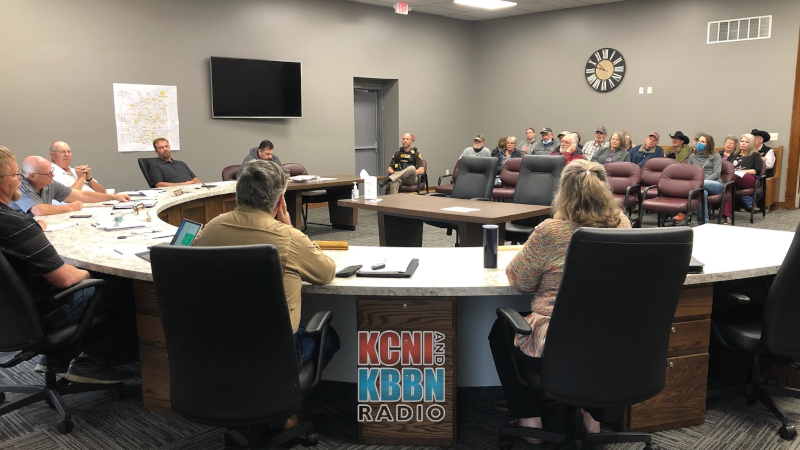While the floods of 2019 have been written in the history books, the after effects continue to be felt two years later and will most likely continue to be felt for years to come. On Tuesday, April 27, residents who live along and travel the Sumner Road attended the Custer County Supervisors meeting to voice their concerns on the condition of the road.
Tom Knott asked for the item to be placed on the agenda to ask the board for clarification on the plan for the road. Supervisor Barry Fox stated that during the February meeting, the road was included in the One and Six Year Plan to pave the first two miles of the road with a ‘hot mix’ asphalt, and turn the rest into gravel. Fox stated the road would not be worked on this year, but was confident the paved part of the road would be started and completed in 2022.
Some of the concerns by those in attendance was the dust from the gravel making travel difficult and also blowing into homes. Fox said he is currently in discussions with Highway Superintendent Chris Jacobsen about how to solve the issue. He noted that the fix would not be immediate nor cheap, but they were looking into ways to hopefully curb that issue.
A good portion of the discussion also centered around traffic counts and how that factors into determining which Custer County roads would be worked on first. Supervisor Don Olson, who serves on the Highway Committee, said he understands the concern that people have about the road, but there are nearly 300 miles of paved road in the county that also have to be taken into consideration.
Fox noted that when the paved roads were built, oil was cheap and it was feasible to pave more roads. Now with prices of oil, equipment, and labor in the $150,000-$300,000 per mile to replace the roads, it is too expensive to maintain and also keep taxes down.
When it came to the traffic counts, questions were raised about how the numbers were calculated. Fox said each year traffic counts are taken with a traffic counter and personnel on site counting vehicles. The numbers are then compared to years previous and they decide if they feel the numbers are accurate or if there are clear issues and the numbers need to be adjusted.
Fox noted combined with the type of road, the surface, the road department budget, and the traffic count, this is the best system they have at the current time to determine which roads need to be prioritized.
Regarding budgets, a member of the public asked why the county was not using funds from the inheritance tax fund to fix the road. Supervisor Dwain Bryner stated the fund has been used in the past few years as an emergency fund for the county and townships. Most recently the county has loaned around $2 million out of the inheritance fund to townships and other departments that were over budget due to the flooding damage.
Bryner noted that other counties have depleted their reserve funds and are now facing problems on how to pay salaries. With this backup of funds, if another emergency were to happen and the county needed funds to pay employees or complete emergency work, having the reserve is necessary.
Fox thanked everyone for attending the meeting and also encouraged them to attend the One and Six Year Plan Public Hearing in the future which is held around February each year to voice their concerns and opinions.
Another discussed item during the meeting was the formation of a new fund, named the COVID American Rescue Plan. Custer County Treasurer Sheri Bryant informed the board that due to the American Rescue Act of 2021 being signed in early March, Custer County will receive over $2 million in federal funds.
Bryant told the board that there is not a great understanding of what the money can be spent on, but the focus seems to be around COVID-19 expenses such as Personal Protective Equipment (PPE), equipment purchased so employees could work from home, and other safety equipment. Bryant stated she wanted to create a separate fund for the money as the interest needs to be monitored.
The Supervisors unanimously approved to create the fund and accept the money, but more research was going to be completed before deciding what to spend the funds on.
Other agenda items included appointing Kelly Flynn as the representative and Supervisor Doug Stunkel as the alternate representative to the Loup Basin RC&D Board, accepting a three-year audit contract, and setting the hearing date to vacate Road 1549 for May 25 at 10:15 AM.
















